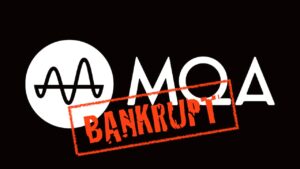MQA BANKRUPT

mqa bankrupt
 By W. Jennings
By W. Jennings
Link:
https://www.ecoustics.com/news/mqa-bankruptcy/?utm_source=newsletter&utm_medium=email&utm_campaign=newsletter-100&utm_content=spotify-video
MQA Files For Chapter 11 Protection: One Too Many Losses Or Will It Be Sold Off In “Bit” Sized Pieces?
MQA has filed for the appointment of administrators in the United Kingdom. Will they have to sell off SCL6 to survive?
Earlier this week MQA filed paperwork with the UK courts for the Appointment of Administrators. This is the British equivalent of filing for chapter 11 bankruptcy protection under United States law. There is a twist to this though as MQA may be able to survive and re-emerge but will likely have to sell off SCL6 (formerly MQAir) to do so.
There have been a series of events in recent months that likely explain why MQA filed when it did.
First, MQA’s attempt to get the MQAir codec into the Bluetooth standard failed when the Bluetooth SIG did not add it to the latest release. MQA had certainly been hoping for that as it would have given them a leg up on other competing codecs as being in the standard would ensure broader compatibility than any of the current proprietary offerings (aptX, LDAC, LHDC, etc.).
Having failed in their attempt to do that, MQAir was left to compete on a more even footing with more established offerings and has a tougher road ahead.

Second, MQA changed the name on MQAir to SCL6; a move that likely was done intentionally to distance the product from the MQA name and make it more sale ready if/when the day came to pass.
Third, Anthony Edward Rupert, Richemont’s (now Reinet) representative on the MQA board resigned his seat roughly a month ago at the same time there was a flurry of debt restructuring going on according to court filings.
Richemont holds a roughly 24% stake in MQA and may well be the stockholder who is looking to sell based on Rupert’s recent departure.
Why would MQA go into Administration though if there is still a possibility of a sale of the SCL6 codec and a return to better days?
That is where the story gets interesting. In order to sell part of MQA, under British law, administrators have to be brought in to be sure that the split is equitable to the existing investors.
In a nutshell, MQA would have to be bought as an entity if they chose to conduct the sale themselves, but under administration, parts of MQA can be sold without buyers having to take on liabilities they are not interested in.
What this likely means is MQA has a suitor for SCL6 but the buyer has said they have no interest in owning the rest of MQA. The upside is MQA may get an infusion of cash from the sale of SCL6 while the downside is that same sale is basically an admission that SCL6 is the only viable product in the MQA stable and what is left after the sale has little value.
That will be a tough hurdle for MQA’s marketing team to recover from.
In the short run, what we as consumers should expect is that MQA files will still work and still be available. I wouldn’t expect TIDAL to start taking down content anytime soon. We will likely see a slowdown in new releases appearing in MQA and new devices supporting MQA as artists and manufacturers take a wait and see approach to this whole proceeding.
We may even see some of MQA’s hardware partners decide to exclude the technology from new product releases until the dust settles.
We could see a company like TIDAL (which is now owned by Jack Dorsey’s Block, previous known as Square) buy up the remaining components of MQA after an SCL6 sale, if the price is right, and incorporate MQA technology into their tech stack. This is speculation on our part.

Chances are good that MQA will be around in some form once the dust settles so don’t write them off just yet, but the road ahead certainly looks a lot more steep and rocky and less certain than all the glowing press releases of the last few years that touted MQA as the coming standard.
MQA is being tight-lipped about all this and released only the following official statement:
“Following the recent positive reception to MQA’s latest technology (SCL6), there has been increased international interest in buying MQA Ltd. At the same time, MQA’s main financial backer is seeking an exit. In order to be in the best position to pursue market opportunities and expedite this process, the company has undergone a restructuring initiative, which includes entering into administration and is comparable to Chapter 11 in the US. During this process, MQA continues to trade as usual alongside its partners. We won’t be commenting further while negotiations take place.”
We may learn more from watching the behavior of other investors in MQA as they attempt to find the most tenable financial positions among the parts that are sold and retained.

Comments By Paul – Right about now Robert (Bobby) Harley is quite upset!
Harley wrote:
THE ABSOLUTE SOUND: THE MOST SIGNIFICANT AUDIO TECHNOLOGY OF MY LIFETIME
MQA Review: Robert Harley
Harley’s descriptions of his experiences of MQA are impressive. He starts off by noting that “It’s not often that an audio technology comes along that has the potential to revolutionize the music industry as well as greatly improve sound quality for all listeners. But I believe that MQA may do just that.” Listening to Keith Johnson’s recording of Stravinsky’s Rite of Spring he called it “the single most realistic reproduction of an orchestra I’ve heard in my life, from any format and on any playback system.”.
And he didn’t stop there. Commenting that “MQA doesn’t tinker at the margins of digital audio with incremental improvements, but rather rethinks the entire encoding and decoding chain while maintaining compatibility with existing infrastructure and file formats”, he concludes, “MQA is the most significant audio technology of my lifetime.”

